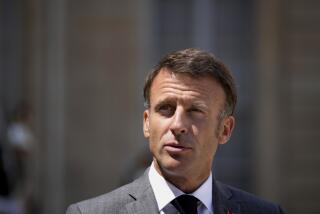French Loosen Ties to Former Africa Colonies
PARIS — When African leader Felix Houphouet-Boigny was laid to rest last week in Ivory Coast, 3,000 miles south of Paris, 100 French politicians stood dutifully at the graveside.
But even as President Francois Mitterrand, Prime Minister Edouard Balladur and other French officials mourned an old friend and assured Africa of their support, they were steadily putting an end to the long, cozy and paternalistic relationship with France’s former colonies on the continent.
The policy changes, which include a 50% devaluation in the French-backed currency in 13 African nations last month, have angered some African leaders and created sudden economic chaos in a French-speaking region that represents a third of the continent. And France’s influence in Africa, though still strong, is bound to diminish, analysts say.
“The significance is that France is letting go of its pretension to be a global empire,” said Mort Rosenblum, author of “Mission to Civilize,” a book on France’s relationship with its former colonies. “This just shows that France is not willing to stand against any tide.”
The tide, in this case, was the growing drain of Africa’s beleaguered economies on France’s own recession-hit budget.
For 46 years, France has propped up the currencies of African countries in the “Franc Zone,” guaranteeing to exchange their currencies for French francs at a rate of 50-to-1. France has also spent an estimated $3 billion a year in its former African colonies, including gifts to meet month-end shortfalls in civil servants’ salaries.
“We just had the feeling we were wasting our money,” said a top-level French official in Paris. “It wasn’t going for development but rather for salaries and debt payments. So we’ve said: ‘We’ll help you in an emergency. But we don’t want this to become a habit anymore.’ ”
The French government insists that it is not abandoning Africa.
Last month, it tried to soften the blow of its new policy by writing off $5 billion in loans to Africa. (In fact, much of France’s aid to Africa flows back into France in contracts for French companies.)
But the French say they want to force Francophone Africa to practice the same fiscal austerity required these days by the government in France.
“Our message to our African friends is, ‘We can help you, but we want you to be responsible too,’ ” the French official said. “We will have our shared history for a long time. But what is changing is the way we look at Africans. Maybe we don’t look down on them anymore.”
Nevertheless, the devaluation, from 50-to-1 to 100-to-1, was tough economic medicine. The region had been accustomed to relative economic and political stability, thanks to France’s treasury and, occasionally, its armed forces.
But, for many Africans, the sudden drop in the value of their African francs represented the biggest change in their lives since independence.
African leaders, under pressure from France and international lenders, agreed to the measures at a meeting in January in Dakar, Senegal. (Thirteen accepted a 50% devaluation, while the tiny island nation of Comoros agreed only to a 33% devaluation.)
But some African officials complained later that they had been presented with a fait accompli.
L’Union newspaper, the mouthpiece for Gabon’s president, Omar Bongo, sharply criticized the decision.
“The selloff of black Africa has begun,” it said in an editorial. “De Gaulle must be turning in his grave. Your heirs have gone crazy, mon general. “
Balladur strongly defended the devaluation and applauded the “courage” of the African leaders.
“The decision was difficult,” he said, “but it shows that Africa is taking its destiny in hand and ensuring the long-term development and well-being of its people. And France will do its utmost to help these countries get through these difficult times.”
The devaluation will cause prices of imported goods in Francophone Africa to double, which is likely eventually to hurt French exports to the region.
Higher prices for such imported staples as rice, already announced by some African leaders, have created deep anxiety in French African capitals. And shoppers went on a buying spree after the devaluation announcement, wiping shelves clean of goods priced according to the old exchange rate.
African leaders are worried because food riots on the continent have toppled more than one government.
To buy political peace in the cities, many African nations have maintained overvalued currencies, which kept food cheap.
But those policies also dried up export markets for farmers, prompting many to give up on the land and flood the cities in search of work.
Now, economic analysts say, the new exchange rates will make French West African products more attractive to the international market, including other African countries.
No immediate increase in exports is expected, though, largely because the world market for Africa’s primary products, such as cocoa and coffee, is deeply depressed.
Yet, those analysts say, the devaluation was a necessary first step to long-term economic growth.
The crisis was precipitated by the refusal of the World Bank and the International Monetary Fund to lend more money to Francophone African countries already unable to meet their debt payments.
International lenders had demanded a devaluation as a condition of writing new loans, and they have responded quickly to help the affected countries.
Mitterrand, the Socialist president, had warned Africa in 1990 that future French aid would be linked to political reform.
But his government did not follow through, and in fact helped several of its friends retain power despite evidence of election fraud.
Then, the Gaullists routed the Socialists in French elections last March, and Balladur quickened the French policy changes in Africa.
Balladur sent a letter to the African leaders last year, urging them to take decisive action to heal their economies.
It was a warning unlike any the leaders had ever received from Paris, and it prompted several, including Houphouet-Boigny, the aging patriarch of French West Africa, to come to France and argue against a devaluation of the African currencies. (Houphouet-Boigny died of cancer on Dec. 7 and was buried on Feb. 7.)
But France’s sentimental attachment to Africa has waned.
“There’s a real generational shift taking place now, and it will continue,” said an American diplomat with long experience in Africa. “Some of the Gaullists care because it’s Africa, and it’s where France is still a world power. But the French people don’t care. They’d rather see their money spent in places like China, where the French can make money.”
‘Franc Zone’
France has for decades propped up the currencies of 14 African countries. But that practice is ending as France backs away from the cozy and costly relationship with its former colonies. Here are the nations of the “Franc Zone.”
Senegal
Mali
Niger
Chad
Central African Republic
Cameroon
Comoros
Gabon
Congo
Equatorial Guinea
Togo
Benin
Burkina Faso
Ivory Coast
More to Read
Sign up for Essential California
The most important California stories and recommendations in your inbox every morning.
You may occasionally receive promotional content from the Los Angeles Times.











